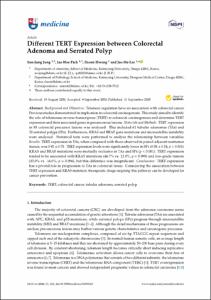Different TERT Expression between Colorectal Adenoma and Serrated Polyp
- Keimyung Author(s)
- Hwang, Il Seon; Lee, Jae Ho
- Journal Title
- Medicina (Kaunas, Lithuania)
- Issued Date
- 2020
- Volume
- 56
- Issue
- 9
- Keyword
- TERT; colorectal cancer; tubular adenoma; serrated polyp
- Abstract
- Background and Objectives:
Telomere regulation have an association with colorectal cancer. Previous studies demonstrated its implication in colorectal carcinogenesis. This study aimed to identify the role of telomerase reverse transcriptase (TERT) in colorectal carcinogenesis and determine TERT expression and their associated genes in precancerous lesions. Materials and Methods: TERT expression in 93 colorectal precursor lesions was analyzed. This included 61 tubular adenomas (TAs) and 32 serrated polyps (SPs). Furthermore, KRAS and BRAF gene mutations and microsatellite instability were analyzed. Statistical tests were performed to analyze the relationship between variables.
Results:
TERT expression in TAs, when compared with those observed in paired adjacent nontumor tissues, was 0.92 ± 0.78. TERT expression levels were significantly lower in SPs (0.38 ± 0.14, p < 0.001). KRAS and BRAF mutations were mutually exclusive in TAs and SPs (p < 0.001). TERT expression tended to be associated with KRAS mutations (46.7% vs. 22.0%, p = 0.098) and low-grade tumors (35.0% vs. 16.0%, p = 0.096), but this difference was insignificant.
Conclusions:
TERT expression has a pivotal role in progression to TAs in colorectal tissue. Considering the association between TERT expression and KRAS mutation, therapeutic drugs targeting this pathway can be developed for cancer prevention.
- Publisher
- School of Medicine (의과대학)
- Citation
- Soo-Jung Jung et al. (2020). Different TERT Expression between Colorectal Adenoma and Serrated Polyp. Medicina (Kaunas, Lithuania), 56(9), 463. doi: 10.3390/medicina56090463
- Type
- Article
- ISSN
- 1648-9144
- Source
- https://www.mdpi.com/1648-9144/56/9/463
- Appears in Collections:
- 1. School of Medicine (의과대학) > Dept. of Anatomy (해부학)
1. School of Medicine (의과대학) > Dept. of Pathology (병리학)
- 파일 목록
-
-
Download
 oak-2020-0490.pdf
기타 데이터 / 1.07 MB / Adobe PDF
oak-2020-0490.pdf
기타 데이터 / 1.07 MB / Adobe PDF
-
Items in Repository are protected by copyright, with all rights reserved, unless otherwise indicated.